|
|
|
Sort Order |
|
|
|
Items / Page
|
|
|
|
|
|
|
| Srl | Item |
| 1 |
ID:
144770
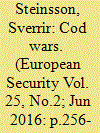

|
|
|
|
|
| Summary/Abstract |
The occurrence and outcomes of the Cod Wars defy both popular and academic expectations. Iceland, a microstate, essentially won four disputes against the UK, a great power. The two states furthermore belonged to a Western security community, sharing significant institutional, economic and cultural ties. This article reviews the history and international relations literature on the Cod Wars to explain and evaluate why the Cod Wars occurred and why Iceland won them. This article also explains what lessons international relations scholarship has learned from the Cod Wars for liberal international relations theory, realism and asymmetric bargaining.
|
|
|
|
|
|
|
|
|
|
|
|
|
|
|
|
| 2 |
ID:
160809
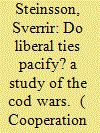

|
|
|
|
|
| Summary/Abstract |
The Cod Wars, three militarized interstate disputes between the UK and Iceland (1958–1961, 1972–1973, 1975–1976), have often been presented as an egregious exception to the liberal peace. There are, however, few comprehensive analyses of the liberal dimensions of the Cod Wars. This article comprehensively analyses the ways in which each of the Cod Wars is consistent or inconsistent with the liberal peace. I find that while the supposedly pacifying factors of the liberal peace – democracy, trade and institutional ties – effectively made the disputes more contentious, they also ensured that escalation to actual war was impossible.
|
|
|
|
|
|
|
|
|
|
|
|
|
|
|
|
| 3 |
ID:
150672
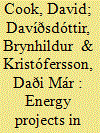

|
|
|
|
|
| Summary/Abstract |
Decision-making in Iceland has occurred without reference to economic valuations of the environmental impacts of energy projects. Environmental Impact Assessments, a legal requirement for nearly all energy projects in Iceland since 1994, have played an important role in identifying the environmental impacts of energy projects, and proposing mitigation measures. However, a purely qualitative description of environmental impacts is insufficient to ensure that they are accounted for equivalently with all of the other costs and benefits of a proposed project. Instead, as monetary information concerning the welfare gains or losses of proposed projects is not currently required to be provided to the licensing body, Orkustofnun, there is the potential for sub-optimal decision-making to occur. As this paper sets out, a broad variety of non-market valuation techniques already exist and could be applied to estimate the value of environmental benefits sacrificed to accommodate such developments. These methods and their outcomes could be incorporated within mandatory cost-benefit assessments for proposed Icelandic energy projects, communicating an estimate of the full welfare implications of approvals to decision-makers and the public alike, and fulfilling an OECD demand for the country to commence such processes.
|
|
|
|
|
|
|
|
|
|
|
|
|
|
|
|
| 4 |
ID:
129440
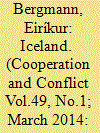

|
|
|
|
|
| Publication |
2014.
|
| Summary/Abstract |
The historical links with imperial Denmark still have an impact on Iceland's foreign policy and its approach to Europe in particular. This article examines the triangular relationship between Iceland, its former colonizers (Norway and Denmark) and the European Union (EU). Iceland's political identity was carved out in the course of its independence struggle from Denmark (1830-1944), based on a fundamental belief in its formal sovereignty, which still dictates Icelandic foreign relations to a great extent. In order to uphold the standard of being considered a modern Nordic welfare state, however, Iceland has an economic need to participate in the EU's internal market, resulting in the European Economic Area agreement. Iceland's postimperial sovereignty games are mostly played within these boundaries. To understand its position within the European project, this paper analyses how, until the economic 'Crash of 2008', the national identity emerging out of the colonial experience has limited Iceland's relationship with the EU.
|
|
|
|
|
|
|
|
|
|
|
|
|
|
|
|
| 5 |
|
| 6 |
|
| 7 |
ID:
125306
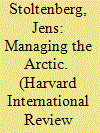

|
|
|
|
|
| Publication |
2013.
|
| Summary/Abstract |
To most people the Arctic is a distant realm, almost another world, inhabited by polar bears. They may even think the frigid landmasses and icy seas of the Arctic are irrelevant to daily life further south. However, the Arctic is changing rapidly. The melting of the sea ice has thrust the region into the global spotlight as world leaders seek to assess both the environmental threats and economic opportunities of a smaller northern ice cap. Norwegians have long balanced a fierce commitment to environmental protection with our substantial Arctic economic interests, and we are eager to help devise responses to the worrying changes we have all observed. The Arctic encompasses more than 15 million square miles or about 8 percent of the surface of the Earth, equivalent to four times the extent of U.S. territory. But the human residents of this vast area number only about 4 million, and are spread across eight countries - Norway, Russia, the United States, Canada, Finland, Sweden, Iceland and Denmark.
|
|
|
|
|
|
|
|
|
|
|
|
|
|
|
|
| 8 |
ID:
103859
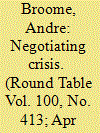

|
|
|
|
|
| Publication |
2011.
|
| Summary/Abstract |
How do small states use international organisations to manage the consequences of exogenous shocks? This article examines this question through exploring how small states negotiate with the International Monetary Fund (IMF) for crisis management support during a period of 'disaster capitalism'. Focusing on the case of Iceland, the article argues that while small states can potentially build scale economies in specialist sectors such as banking, the risks inherent in rapid financial expansion greatly increase their vulnerability to external shocks. In such circumstances, small states are likely to struggle to level the playing field in their attempts to negotiate the constraints and opportunities provided by engagement with the IMF during international crises, when they face higher stakes compared with larger economies and have a narrower policy choice set at their disposal.
|
|
|
|
|
|
|
|
|
|
|
|
|
|
|
|
| 9 |
ID:
079096


|
|
|
|
|
| Publication |
2007.
|
| Summary/Abstract |
This article explores the notion of a 'Nordic approach' to peace support operations by analysing the Nordic states' commitment to UN interventions during the period of 1991-99. The Nordic states varied considerably in their individual choices on where, when and by what magnitude to commit to such interventions. The observed discrepancies reveal that the notion of a 'Nordic approach' is beset with strong limitations; the concept's implied homogeneity is simply missing. To convincingly capitalize on the notion of a Nordic approach, the Nordic states would have needed to put the issue on a common agenda.
|
|
|
|
|
|
|
|
|
|
|
|
|
|
|
|
| 10 |
ID:
035148


|
|
|
|
|
| Publication |
Amsterdam, Elsevier Publishing company, 1969.
|
| Description |
xii, 449p.:mapsHbk
|
|
|
|
|
|
|
|
|
|
|
|
Copies: C:1/I:0,R:0,Q:0
Circulation
| Accession# | Call# | Current Location | Status | Policy | Location |
| 006086 | 912.198/THO 006086 | Main | On Shelf | General | |
|
|
|
|
| 11 |
ID:
132649
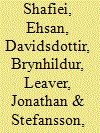

|
|
|
|
|
| Publication |
2014.
|
| Summary/Abstract |
This paper develops a system dynamics model of Iceland×s energy sector (UniSyD_IS) that is based on the UniSyD_NZ model of New Zealand×s energy economy. The model focuses on the energy supply sector with endogenous representation of road transport energy demand. Equilibrium interactions are performed across electricity, hydrogen, biofuels, and road transport sectors. Possible transition paths toward a low-carbon transport in Iceland are explored with implications for fuel demand, greenhouse gas (GHG) emissions and associated costs. The consumer sector simulates the long-term evolution of light and heavy-duty vehicles through a vehicle choice algorithm that accounts for social influences and consumer preferences. Through different scenarios, the influences of four fundamental driving factors are examined. The factors are oil price, carbon tax, fuel supply-push, and government incentives. The results show that changes in travel demand, vehicle technologies, fuel types, and efficiency improvements can support feasible transition paths to achieve sufficient reduction in GHG for both 4 °C and 2 °C climate scenarios of the Nordic Energy Technology Perspectives study. Initial investment in supply infrastructure for alternative fuels will not only mitigate GHG emissions, but also could provide long-term economic benefits through fuel cost saving for consumers and reduced fuel import costs for government
|
|
|
|
|
|
|
|
|
|
|
|
|
|
|
|
| 12 |
ID:
133390


|
|
|
|
|
| Publication |
2013.
|
| Summary/Abstract |
The Arctic, during the Cold War a locus of intense military competition between the United States and the Union of Soviet Socialist Republics, is rapidly reemerging as a geostrategic flash point. As accelerating climate change melts the Arctic's perennial sea ice, littoral as well as peripheral actors are preparing to exploit emergent economic and strategic opportunities in the High North. Although the possibility of armed conflict over Arctic resources has been somewhat discounted, a fair amount of saber rattling in recent years among the "Arctic Eight"-the United States, Russia, Canada, Denmark, Finland, Iceland, Norway, and Sweden-has given rise to the notion that circumpolar security actors may be priming for a "new kind of Cold War" in the North.
|
|
|
|
|
|
|
|
|
|
|
|
|
|
|
|
| 13 |
ID:
101881


|
|
|
|
|
| Publication |
2010.
|
| Summary/Abstract |
THE PROPOSAL of an assignment to Iceland made to me over the phone when I was on vacation by the chief of the Foreign Ministry Personnel Department who gave me two days to think about it, for the umpteenth time confirmed the correctness of my idea formed over more than 30 years of diplomatic service of the unpredictability of the chosen career.
|
|
|
|
|
|
|
|
|
|
|
|
|
|
|
|
| 14 |
ID:
110308


|
|
|
|
|
| Publication |
2012.
|
| Summary/Abstract |
The establishment of the Icelandic peacekeeping unit (ICRU), in 2001, signalled Iceland's increased participation in various UN peacekeeping projects in conflict-ridden areas, and can be seen as a part of an emphasis during its economic boom years on Iceland as an important international player. Engagement in foreign conflicts has, however, never been a part of Icelandic national identity. Iceland had prided itself on its lack of a national army and non-engagement in war-related activities. In exploring this contradiction the article's claim is that in the public media ICRU participation in conflicts was depoliticized because the Icelandic government placed it within an emerging international humanitarian framework. The Icelandic example indicates how extremely political issues are depoliticized locally by reflecting international discourses.
|
|
|
|
|
|
|
|
|
|
|
|
|
|
|
|
| 15 |
ID:
095983


|
|
|
|
|
| Publication |
2010.
|
| Summary/Abstract |
Despite a general acknowledgement that knowledge about identities is essential for understanding international relations, surprisingly little has been written about what actually activates one of a state's many identities and not another. More generally, the article suggests that situational relevance and commitment are of importance. More specifically, it is suggested that a policy area's legitimisation is a factor that may affect the commitment to a collective identity. The argument is illustrated by the case of 'Norden', as the inhabitants of Denmark, Iceland, Norway and Sweden call their territory. The end of the Cold War and Sweden and Finland joining Denmark in the European Union (EU) put Nordic identity under severe stress in the beginning of the 1990s. As shown, this collective identity was intensely active in the case of the Nordic Passport Union, but less so in the case of environmental negotiations.
|
|
|
|
|
|
|
|
|
|
|
|
|
|
|
|
|
|
|
|
|